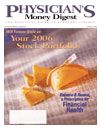Publication
Article
Physician's Money Digest
Close-up: Asset Protection Scams
Author(s):
n.
Scam: A fraudulent business scheme; a swindle. In the case of asset protection,scams come under the guise of providing asset protection structures.
Scams have been around for probably as long asthere have been people with assets and unscrupulousindividuals who wish to abscond with thoseassets. When the stock market slumped badly severalyears back, asset protection leaped to the forefront in theminds of many physician-investors who desperately wantedto protect the nest eggs they had built. That desire forasset protection has, unfortunately, given rise to anincreasing number of asset protection scams.
The first thing to know in recognizing an asset protectionscam is that you simply can't hide your assets somewhere.Any individual or organization that attempts to convinceyou that it's fair game to hide your assets is no doubt hidingsomething from you—the truth. However, many ofthese asset protection scams are so cleverly designed anddisguised it can be difficult to separate fact from fiction. Adiscerning eye and the advice of a licensed attorney are thebest weapons against such scams.
Beware of Advice and Seminars
According to the Web site of Financial & Tax FraudEducation Associates (www.quatloos.com), lots of goodplanners offer asset protection seminars. However, theyare in the minority, because the best planners are usuallybusy working for their clients as opposed to cruising theseminar circuit. Those planners, the Web site points out,are either making money by giving expensive or cheapseminars, but making up the difference by selling booksand other do-it-yourself asset protection materials. And,the Web site cautions, if you do attend one of these seminars,don't be so quick to fork over $1500 for these so-calledproven materials just because 20 people havequickly formed a line waiting to purchase. Quite often,these people are shills who are paid by those running theseminar to make it appear that the materials for sale area great buy. Keep your checkbook closed.
The Web site also notes that, "A recent phenomenon isthe entry of accountants into the asset protection planningsector. [However,] their planning will often put you in muchworse shape than if you had done nothing at all."The reasonis that asset protection, when you get right down to it,is prelitigation planning—and accountants are usuallyunaware of criminal laws. Unless an attorney is directlyinvolved and retains the accountant, any communicationexchange between you and the accountant is not subject toattorney-client privilege. In short, stick with an attorney.
Currently Circulating Scams
One popular asset protection scam is the Foreign BankAccount Scheme. According to the Web site OffShorePress.com, so-called advisors will often say that money ina foreign bank account is protected from any creditors.However, this is only true if you are able to keep the existenceof the account a secret and are willing to commitperjury on your tax return. If that doesn't sound appealingto you, steer clear of opening such an account.
Perhaps the most widespread asset protection scam is thepure trust scam, which, according to Quatloos.com, goes byseveral aliases, including Constitutional Trust, Patriot Trust,and Common Law Trust Organization. These pure trusts areusually part of a multitiered trust structure that would seemto hide the existence of the trust, but in reality, only makes itseem like the structure is worth the cost. The bottom line isthat the IRS has never lost a case against the pure trust andflocks to them like bees to honey. You might as well wave ared blanket at an angry bull.
Your best bet is to talk to an attorney who is a memberof the American Bar Association's Asset Protection PlanningCommittee (www.abanet.org). There are no guarantees,but in general, the best and brightest asset protectionplanners are on this committee.
Asset Protection Scam Terminology
A good way to recognize asset protectionscams is to understand the language they speakand the terminology used. According to Financial& Tax Fraud Education Associates, the followingare some of the more popular terms:
•Asset protection consultant. A multilevelmarketing scam involving franchisees who pay$10,000 to become "consultants"in the area ofasset protection, though they have no educationor training in the area.
•Asset protection kits. Do-it-yourself packagesthat claim to allow purchasers to create one-size-fits-all asset protection plans. The quality ofthese plans is highly suspect.
•Cookie-cutter plan. A plan of a one-size-fits-all nature sold by promoters who make enormousprofits selling the plans. The effectiveness ofthese plans is also questionable.
•The Father of Asset Protection. A self-anointedtitle used by some cookie-cutter promotersin their sales materials to give the impressionthat they created the world of asset protection.
•Pure trust. A sham trust sold by scam artiststhat purports to be free of government regulationor intervention because of the Contract Clause ofthe US Constitution.
POP QUIZ
1) One of the best weapons against an asset protectionscam is
- a CPA.
- a licensed attorney.
- attending an asset protection meeting.
- the purchase of a good book.
2) A good way to think about your asset protectionplanning approach is
- prelitigation planning.
- hide-and-seek planning.
- catch-me-if-you-can planning.
- estate planning.
3) A foreign bank account is an effective, legitimateway to hide your assets. True or false?
- True
- False
4) A pure trust is virtually impenetrable as an asset protectionvehicle. True or false?
- True
- False
5) The problem with do-it-yourself asset protection kits is
- they're hard to find.
- they're difficult to set up.
- their quality is suspect.
- Wal-Mart doesn't carry them.
Answers: 1) b; 2) a; 3) b; 4) b; 5) c.
